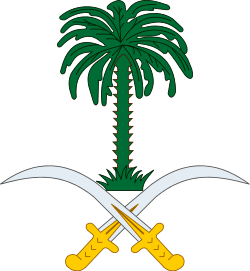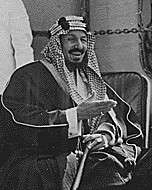Nawwaf bin Abdulaziz Al Saud
| Nawwaf bin Abdulaziz | |||||
|---|---|---|---|---|---|
.jpg) | |||||
| Director General of Intelligence Agency | |||||
| In office | 1 September 2001 – 26 January 2005 | ||||
| Predecessor | Turki bin Faisal | ||||
| Successor | Muqrin bin Abdulaziz | ||||
| Monarch |
King Fahd King Abdullah | ||||
| Born |
16 August 1932 Riyadh, Kingdom of Hejaz and Nejd | ||||
| Died |
29 September 2015 (aged 83) Riyadh, Saudi Arabia | ||||
| Spouse | Jawahir Al Alsheikh | ||||
| |||||
| House | House of Saud | ||||
| Father | King Abdulaziz | ||||
| Mother | Munaiyir | ||||
| Religion | Islam | ||||
Nawwaf bin Abdulaziz (16 August 1932 – 29 September 2015) was a senior member of the House of Saud and was a close ally of the deceased King Abdullah.[1]
Early life
Prince Nawwaf was born on 16 August 1932.[2] He was the twenty-second son of King Abdulaziz.[3]
He was a full brother of Prince Talal. Their mother was an Armenian, Munaiyir, whose family escaped from the Armenian Genocide experienced under the reign of the Ottoman Empire from 1915 to 1923.[4] Munaiyir was presented to Abdulaziz when she was 12 years old in the place of emir of Unayzah in 1921. Their first child, Talal, was born in 1924. Following the tradition, Munaiyir became to be known as Umm Talal, "mother of Talal".[4] However, in 1927, the three-year-old Talal died. Later, she gave four children to King Abdulaziz, one of them is Prince Nawwaf. It is not exactly known when Abdulaziz divorced his fourth wife and formally wed Munaiyir. It is reported by her family that she remained illiterate all her life.[4] Munaiyir was regarded by British diplomats in Saudi Arabia as one of King Abdulaziz’s favourite wives. She was as known for her intelligence as for her beauty.[5] Munaiyir died in December 1991.[2]
During the reign of King Saud, his relations with his full-brother Prince Talal became negative, even leading to contesting their inheritances.[6]
Education
Nawwaf bin Abdulaziz received his primary Arabic and Islamic education in Saudi Arabia. He also obtained his university education in Islamic civilization in the Kingdom and completed his higher studies in the United States.[7]
Political career
Nawwaf bin Abdulaziz served briefly as chief of the royal court in 1961.[2] He was also appointed finance minister by King Saud and served in the post for two years.[2][8] He succeeded Prince Talal in the post.[9] Later Prince Nawwaf worked as King Faisal's special adviser for Persian Gulf affairs from 1968 to 1975.[8] In 1968, following the evacuation of the British forces from the Persian Gulf region, King Faisal named him as one of his special advisors. In view of his experience in various spheres, King Faisal sent him to participate in official delegations of the Kingdom at various meetings, including Arab and Islamic summits and meetings of non-aligned countries. He also led the Kingdom's delegations on behalf of King Faisal or work as his special envoy. Prince Nawwaf was thoroughly familiar with international policy and law, and was also an expert on the Middle East affairs. He did his best to unify the ranks of the Arab emirates and to integrate these emirates into one state following their partitions into seven tiny states during the colonial rule.[7] In view of his rich experience in economic and political spheres, Prince Nawwaf was delegated to serve as the Saudi Government's official spokesman and its special envoy on several occasions. He visited the four corners of the world and positively contributed to the settlement of numerous disputes in Africa and the Middle East as well as in other parts of the world. He also accompanied Crown Prince Abdullah during his official foreign trips.[7] However, Prince Nawwaf did not hold any official position until 2001.[10]
Prince Nawwaf was appointed director general of Saudi intelligence agency Al Mukhabarat Al A'amah following Prince Turki's resignation on 1 September 2001.[11][12][13] His appointment did not result in significant power change in the royal family, since late King Fahd's son, Saud bin Fahd, continued to serve as deputy director which he had been serving since 1985.[14] Prince Nawwaf's tenure lasted until 26 January 2005 when he resigned due to health concerns.[3][15] Immediately after the acceptance of his resignation, then King Fahd appointed him as his special advisor.[15] Prince Muqrin replaced Prince Nawwaf as the director general of Saudi intelligence agency in October 2005, nine months after his resignation.[16][17][18]
He was a special advisor to the late King Abdullah at the rank of minister[3] and his term was extended for four years in 2009.[1]
Other activities
Prince Nawwaf was one of the supporters of the Free Princes Movement led by his brother Prince Talal in the early 1960s.[19] He also contributed to the establishment of some industrial projects inside and outside the Kingdom to serve the Arab economy. His contribution to the strengthening of the Kingdom's relations with other world states is widely respected. He was one of the founders and a major shareholder of the Saudi-New Zealand Bank. He also owned some investment projects in the fields of real estate and tourism. He was one of the pioneers of the solar energy industry. Realizing the importance of solar energy, he extended his support to Sydney University in Australia to enable it to conduct research and studies in this field.[7]
Views
A Saudi survey conducted shortly after the 11 September attacks concluded that 95 percent of educated Saudi men aged between 25 and 41 supported ‘bin Laden’s cause. Nawwaf bin Abdulaziz argued that this support is motivated by Saudi anger over U.S. support for Israel.[20] After the US sanctions against Iran in 2000, Prince Nawwaf said "Iran is being treated unfairly by some countries and this is not in the interests of the Arabia Gulf or even the US."[10]
Illness and death
In March 2002, Prince Nawwaf was admitted to the American University hospital in Beirut after suddenly suffering a stroke.[7] He was in Beirut for the Arab League summit meeting.[21][22] He was reported to have suffered a brain haemorrhage.[15][22] Then he underwent a surgery in 2002.[3] He was confined to a wheelchair following his health problems.[23]
Prince Nawwaf died on 29 September 2015 at the age of 83.[24]
Personal life
Prince Nawwaf was married to Jawahir Al Alsheikh, together they had three children: Abdulaziz (born 1979), Faisal (born 1984) and Sarah (born 1989).[2] In 2008, his daughter Princess Sarah was a student at Franklin College in Lugano, Switzerland, pursuing a degree in international communications.[25] Mohammed bin Nawwaf was his eldest son and has been Saudi ambassador to United Kingdom and Ireland since 2005.[26]
Honours
-
_GC.svg.png) Knight Grand Cross of the Order of Civil Merit (Spain, 15 February 1974).[27]
Knight Grand Cross of the Order of Civil Merit (Spain, 15 February 1974).[27]
Ancestry
| Ancestors of Nawwaf bin Abdulaziz Al Saud | |||||||||||||||||||||||||||||||||||||||||||||||||||||||||||||||||||||||||||||||||||||||||||||||||||||||||||||||||||||||||||||||||||||||||||||||||||||||||||||||||||||||||||||||||||||||||||||||||||||||||||||||||||||||||||||||||||||||||||||||||||||||||||
|---|---|---|---|---|---|---|---|---|---|---|---|---|---|---|---|---|---|---|---|---|---|---|---|---|---|---|---|---|---|---|---|---|---|---|---|---|---|---|---|---|---|---|---|---|---|---|---|---|---|---|---|---|---|---|---|---|---|---|---|---|---|---|---|---|---|---|---|---|---|---|---|---|---|---|---|---|---|---|---|---|---|---|---|---|---|---|---|---|---|---|---|---|---|---|---|---|---|---|---|---|---|---|---|---|---|---|---|---|---|---|---|---|---|---|---|---|---|---|---|---|---|---|---|---|---|---|---|---|---|---|---|---|---|---|---|---|---|---|---|---|---|---|---|---|---|---|---|---|---|---|---|---|---|---|---|---|---|---|---|---|---|---|---|---|---|---|---|---|---|---|---|---|---|---|---|---|---|---|---|---|---|---|---|---|---|---|---|---|---|---|---|---|---|---|---|---|---|---|---|---|---|---|---|---|---|---|---|---|---|---|---|---|---|---|---|---|---|---|---|---|---|---|---|---|---|---|---|---|---|---|---|---|---|---|---|---|---|---|---|---|---|---|---|---|---|---|---|---|---|---|---|
| |||||||||||||||||||||||||||||||||||||||||||||||||||||||||||||||||||||||||||||||||||||||||||||||||||||||||||||||||||||||||||||||||||||||||||||||||||||||||||||||||||||||||||||||||||||||||||||||||||||||||||||||||||||||||||||||||||||||||||||||||||||||||||
References
- 1 2 "Further Prince Sultan succession speculation" (PDF). Gulf States Newsletter. 33 (845). 16 January 2009. Retrieved 31 May 2012.
- 1 2 3 4 5 Sabri Sharaf (2001). The House of Saud in Commerce: A Study of Royal Entrepreneurship in Saudi Arabia. Sharaf Sabri. p. 126. ISBN 978-81-901254-0-6. Retrieved 2 April 2013.
- 1 2 3 4 "HRH Prince Nawaf bin Abdulaziz". Kingdom of Saudi Arabia, General Intelligence Presidency. Retrieved 5 May 2012.
- 1 2 3 Rossant, John (19 March 2002). "The return of Saudi Arabia's red prince". Online Asia Times. Retrieved 4 May 2012.
- ↑ Stenslie, Stig (2011). "Power Behind the Veil: Princesses of House of Saud". Journal of Arabian Studies: Arabia, the Gulf, and the Red Sea. 1 (1): 69–79. doi:10.1080/21534764.2011.576050.
- ↑ Kechichian, Joseph A. (2001). Succession in Saudi Arabia. New York: Palgrave. p. 29. Retrieved 6 April 2012.
- 1 2 3 4 5 "Prince Nawaf ibn Abdulaziz Al Saud". Global Security. Retrieved 11 May 2012.
- 1 2 "Prince Nawaf new intelligence chief". Arab News. 1 September 2001. Retrieved 6 April 2013.
- ↑ Yitzhak Oron, Ed. Middle East Record Volume 2, 1961. The Moshe Dayan Center. p. 419. GGKEY:4Q1FXYK79X8. Retrieved 11 April 2013.
- 1 2 "Saudi Prince Criticizes Washington's Policy against Tehran". Albawaba. 1 September 2000. Retrieved 6 April 2013.
- ↑ "Who's Who in the House of Saud". The New York Times. 22 December 2002. Retrieved 10 February 2013.
- ↑ Tyler, Patrick E (24 September 2001). "A Nation challenged: Arab Ally. Saudis Feeling Pain of Supporting U.S.". New York Times. Retrieved 9 February 2011.
- ↑ Anthony H. Cordesman (2003). Saudi Arabia Enters the 21st Century. Greenwood Publishing Group. p. 46. ISBN 978-0-275-97997-3. Retrieved 10 February 2013.
- ↑ Volker Perthes (2004). Arab Elites: Negotiating the Politics of Change. Lynne Rienner Publishers. p. 141. ISBN 978-1-58826-266-0. Retrieved 1 February 2013.
- 1 2 3 "Saudi accepts resignation of intelligence chief". Daily Times. 27 January 2005. Retrieved 5 August 2012.
- ↑ "New Saudi spymaster marks shift in policy" (Special Report). UPI. Riyadh. 26 July 2012. Retrieved 10 February 2013.
- ↑ Anthony H. Cordesman; Khalid R. Al Rodhan (2007). Gulf Military Forces In An Era Of Asymmetric Wars:. Greenwood Publishing Group. p. 235. ISBN 978-0-275-99399-3. Retrieved 10 February 2013.
- ↑ "Prince Moqrin head of Saudi intelligence". UPI. Riyadh. 22 October 2005. Retrieved 6 April 2013.
- ↑ Vijay Prashad (2007). The Darker Nations- A Biography of the Short-Lived Third World. LeftWord Books. p. 275. ISBN 978-81-87496-66-3. Retrieved 13 September 2013.
- ↑ Quilliam, Neil; Maggie Kamel (2003). "Modernising Legitimacy: Saudi Strategies" (PDF). Alternatives: Turkish Journal of International Relations. 2 (2). Retrieved 21 April 2012.
- ↑ "Mideast Turmoil; Saudi Suffers a Stroke". The New York Times. 28 March 2002. Retrieved 5 August 2012.
- 1 2 "No. 2 Saudi Delegate Suffers Stroke". Los Angeles Times. Beirut. AP. 28 March 2002. Retrieved 6 April 2013.
- ↑ Henderson, Simon (24 July 2012). "The Prince and the Revolution". The Washington Institute. Retrieved 11 August 2013.
- ↑ "Saudi Prince Nawwaf bin Abdulaziz al-Saud dies at age 83". Al Bawaba. 29 September 2015. Retrieved 3 October 2015.
- ↑ "Travels with Lacie and a Saudi princess". Mercer Island Reporter. 24 November 2008. Retrieved 5 May 2012.
- ↑ "Committee Members". The Saudi British Society. Retrieved 10 February 2013.
- ↑ Boletín Oficial del Estado
| Political offices | ||
|---|---|---|
| Preceded by Turki bin Faisal |
Al Mukhabarat Al A'amah 2001–2005 |
Succeeded by Muqrin bin Abdulaziz |


